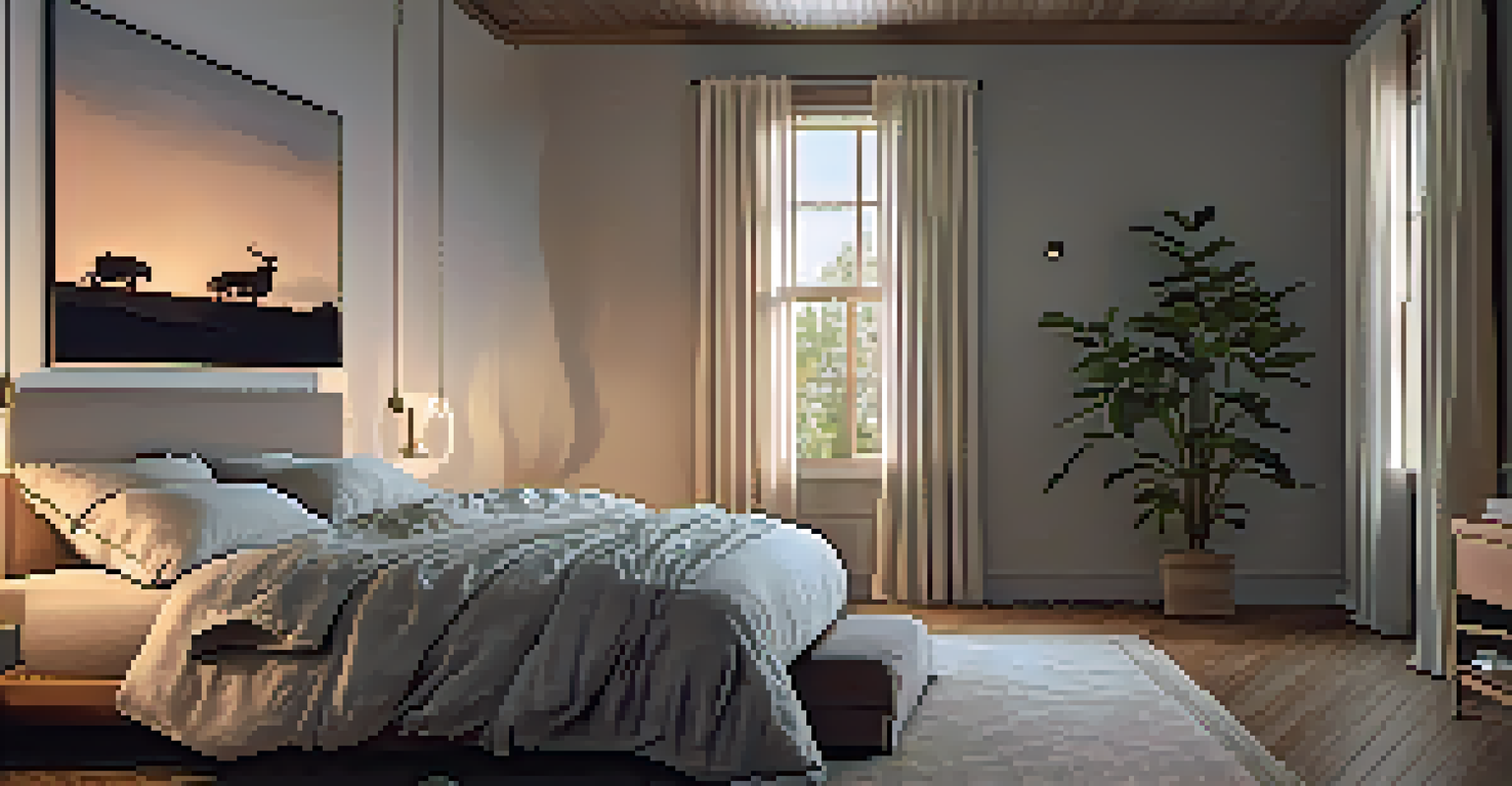Assessing Your Sleep Environment: Tips for Improvement

Evaluate Your Bedroom Layout for Optimal Sleep
Begin by assessing the layout of your bedroom. A clutter-free space can significantly impact your ability to relax and unwind. Consider the flow of the room; ensure that your bed is positioned for comfort and accessibility.
A good laugh and a long sleep are the best cures in the doctor’s book.
Think about how the arrangement of furniture might affect your sleep. For instance, placing your bed away from windows can help reduce disturbances from outside noise or light. Additionally, a cozy reading nook can encourage a calming bedtime routine.
Lastly, keep in mind that personal preferences vary. Some people may sleep better in a room that feels open and spacious, while others prefer a more enclosed, cozy atmosphere. Experiment with different layouts to find what works best for you.
Control Light Levels for a Restful Night
Light plays a crucial role in regulating our sleep cycles. To foster better sleep, consider using blackout curtains to block out early morning light or street lamps. This can help signal to your body that it's time to rest.

In addition to blocking unwanted light, think about the type of lighting you use in your bedroom. Soft, warm lights can create a calming environment, while harsh fluorescent bulbs may disrupt your ability to relax. Using dimmers can also allow you to adjust the brightness according to the time of day.
Optimize Your Bedroom Layout
A well-arranged bedroom can enhance relaxation and promote better sleep quality.
Finally, don’t forget about technology. The blue light emitted by screens can interfere with melatonin production, making it harder to fall asleep. Try to limit screen time before bed, or use blue light filters to mitigate its effects.
Reduce Noise to Enhance Sleep Quality
Noise can be a significant barrier to a good night's sleep. Start by identifying any disruptive sounds in your environment, whether it's traffic, loud neighbors, or even a ticking clock. Once you know what you're up against, you can take steps to minimize the impact.
Sleep is the golden chain that ties health and our bodies together.
Consider using white noise machines or apps that create soothing sounds to drown out distractions. Gentle rain sounds or ocean waves can be particularly effective in creating a calming atmosphere. Alternatively, earplugs can offer a simple and effective solution for light sleepers.
If you have control over your environment, think about soundproofing options. Adding rugs, curtains, or wall hangings can absorb sound and reduce echo, creating a more serene space. Even small changes can make a big difference in your sleep quality.
Maintain a Comfortable Room Temperature
The temperature of your room can significantly affect your sleep quality. Ideally, a cool room between 60-67°F (15-19°C) is considered optimal for most people. This cooler temperature helps lower your body's core temperature, signaling that it's time to sleep.
If you find your room gets too warm, consider using fans or air conditioning to maintain a comfortable climate. On cooler nights, layering your bedding can provide warmth without overheating. Remember, it's all about finding that sweet spot that makes you feel cozy without getting too hot.
Control Light for Better Sleep
Managing light levels with blackout curtains and soft lighting can significantly improve your ability to fall asleep.
Don’t forget about bedding materials as well. Natural fabrics like cotton and linen are breathable and can help regulate body temperature, while synthetic materials may trap heat. Choosing the right bedding can enhance your sleeping experience.
Invest in Quality Mattresses and Pillows
Your mattress and pillows are key players in your sleep environment. An uncomfortable mattress can lead to tossing and turning, while the wrong pillow can cause neck pain. It's worth investing in high-quality sleep products that cater to your specific needs.
When selecting a mattress, consider your sleep position and personal comfort preference. Memory foam, latex, or innerspring mattresses all offer different benefits. Testing out different options in-store or taking advantage of trial periods can help you find your perfect match.
Pillows also deserve attention; consider your preferred sleeping position when choosing one. Side sleepers may benefit from firmer, thicker pillows, while stomach sleepers might need something softer and thinner. A good pillow can mean the difference between a restful night and a restless one.
Declutter and Organize Your Sleep Space
A tidy room can promote a peaceful mind, making it easier to drift off to sleep. Start by decluttering your space—remove items that don’t belong in the bedroom, like work materials or exercise equipment. A clean environment helps create a sanctuary for relaxation.
Consider organizing your belongings to create a more streamlined look. Storage solutions like baskets or under-bed storage can help keep things tidy while maintaining accessibility. An organized space can lead to a more relaxed mindset as you prepare for bed.
Invest in Quality Sleep Essentials
Choosing the right mattress and pillows tailored to your sleep preferences is crucial for achieving restful nights.
Finally, make it a habit to maintain this order. Taking just a few minutes each day to tidy up can prevent clutter from building up again. Over time, you’ll find that a clean, organized space contributes significantly to your overall sleep quality.
Incorporate Calming Scents for Better Rest
Aromatherapy can be a delightful addition to your sleep environment. Scents like lavender, chamomile, and sandalwood are known for their calming properties and can help signal to your brain that it's time to wind down. Consider using essential oils, candles, or pillow sprays to incorporate these soothing aromas.
You might also explore how scent affects your personal sleep experience. For some, certain fragrances can evoke pleasant memories or feelings of safety, which can lead to a more restful night. Experiment with different scents to find what resonates with you.

Be mindful of how you use scents in your sleep space. Strong fragrances can be overwhelming, and less is often more. A subtle hint of your chosen aroma can provide the perfect backdrop for a peaceful night’s sleep.
Create a Personalized Sleep Routine
Developing a consistent sleep routine can be incredibly beneficial in improving your overall sleep quality. Try to establish a specific bedtime and wake-up time, even on weekends. This consistency helps regulate your body's internal clock, making it easier to fall asleep and wake up refreshed.
Incorporate relaxing activities into your routine leading up to bedtime. Whether it's reading a book, practicing meditation, or enjoying a warm bath, these calming rituals can signal to your body that it's time to wind down. The key is to find what works for you and stick to it.
Finally, be patient with yourself. It may take some time to adjust to a new routine, but persistence can lead to improved sleep. Listen to your body and make adjustments as needed to create a personalized approach to restful nights.